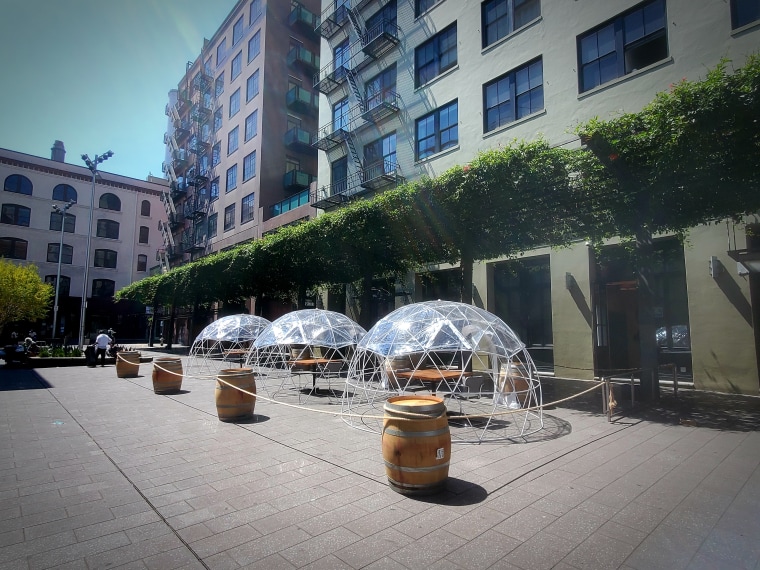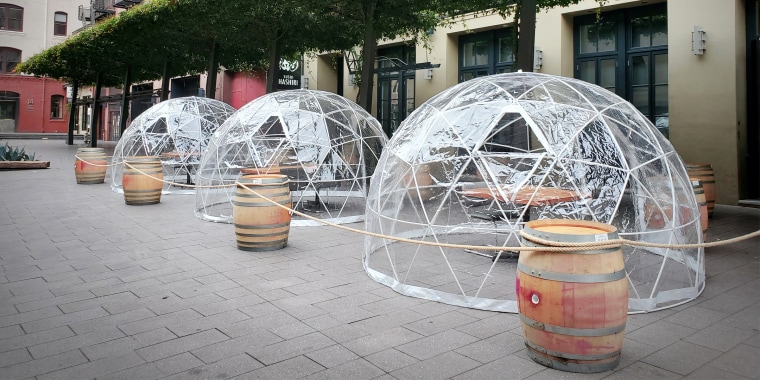Hashiri, a Michelin-starred, kaiseki-style sushi restaurant in San Francisco, has been told to take down its "dining domes" by city officials. The clear plastic dining domes in historic Mint Plaza were meant to give diners a unique experience during the pandemic. But some said they highlighted the disparity between the high-end restaurant and the local homeless population on the other side of the enclosures.
On Aug. 13, the restaurant was told to remove the domes because they do not provide sufficient airflow to prevent the transmission of COVID-19. On Tuesday, Hashiri issued a thank you to its patrons for their support on Instagram.
"... Many of you may be aware of the challenges we encounter and the recent visit by the health department that ordered a cease & desist for use of geodesic domes in the plaza," read the post. "We deeply apologize to our patrons with reservation and the intent to dine with us in our igloo geodesic domes. Unfortunately, we are currently unable to offer our dining experience in the geodesic domes, however we are still open for regular service."
The restaurant was inspected on Aug. 13 following a complaint regarding the use of enclosures for outdoor dining.
"We are taking the extra measures to offer a safe / peaceful dining experience and working on multiple proposals to the Health department. Please stay tuned we will work towards an ideal outcome!" the management wrote on Instagram.
The restaurant, located in the SoMa (South of Market) neighborhood, set up the domes the first week of August and introduced them on Facebook by offering a five-course dining experience priced at $200 per person.
"DPH conducted a complaint investigation at Hashiri Restaurant on 8/13/20," read a statement emailed to TODAY Food. "The inspection report was issued to the restaurant and required a cease and desist of the use of the igloos due to the enclosed nature of the igloo structure which may not allow for adequate air flow. Per HO Directive No 2020-16b, free flow of air through an outdoor dining space is a service requirement (Exhibit A, Sec 1.7). The health inspector discussed possible modifications to the igloos with management and welcomes a submission of a proposal for DPH review and approval before use."
The citation noted that Hashiri, which has three dining domes that seat a maximum of four people each, was in violation of local directives that “Umbrellas, canopies, and other shade structures are only allowed if they do not have sides and allow for the free flow of air through the space.”
"The key to outdoor dining is the free flow of air," Dr. Anne Rimoin, professor of epidemiology at UCLA told TODAY. "It’s not clear to me that these domes will keep people in them safe nor the servers who would have to enter the domes to serve the people inside them, who would be dining presumably without masks on, with poor airflow. Given the current setup, it seems that these domes might end up promoting transmission instead of preventing it."
"It’s devastating for us," Hashiri manager Kenichiro Matsuura told TODAY regarding the shutdown of what he thought was a viable solution to the ban on indoor dining as many restaurants have struggled to stay afloat during the pandemic. Matsuura said they had tried regular outdoor dining in June but encountered problems keeping their diners and staff safe.
"A lot of restaurants were doing the greenhouse concept so we improvised on that and encountered these geodesic igloo domes," he explained. "They are good for blocking wind and garbage blowing in."
Matsuura said that no inspector actually went inside the igloos, which have two windows and a door, before determining they had inadequate ventilation.

The restaurant took down the coverings and has continued service inside just the shells of the domes. Following a new health inspection Wednesday, Hashiri was cleared to reopen with the modified igloos that have four feet of clearance around the bottom of the entire circumference, which will allow for more ventilation. Matsuura said they reopened for dinner service Wednesday and that the city has been working with them to find a solution.
"We want to work with them to make an ideal experience," he said.
As for the accusations that the restaurant is trying to shelter its diners from the homeless, Matsuura said that is untrue.
"I never used the term 'homelessness,'" he said. "I want to clarify, it’s unwanted energy and unsafe crowds and a drug pandemic that we have to deal with. We are a community team. We clean the plaza. We’ve been as supportive as possible."
It's unclear what impact the temporary igloo shutdown will have on other restaurants that have come up with creative ways to serve customers during the pandemic. It's not the first time a restaurant has made use of plastic barriers: One restaurant in Ohio even used shower curtains to separate tables and maintain social distancing.

